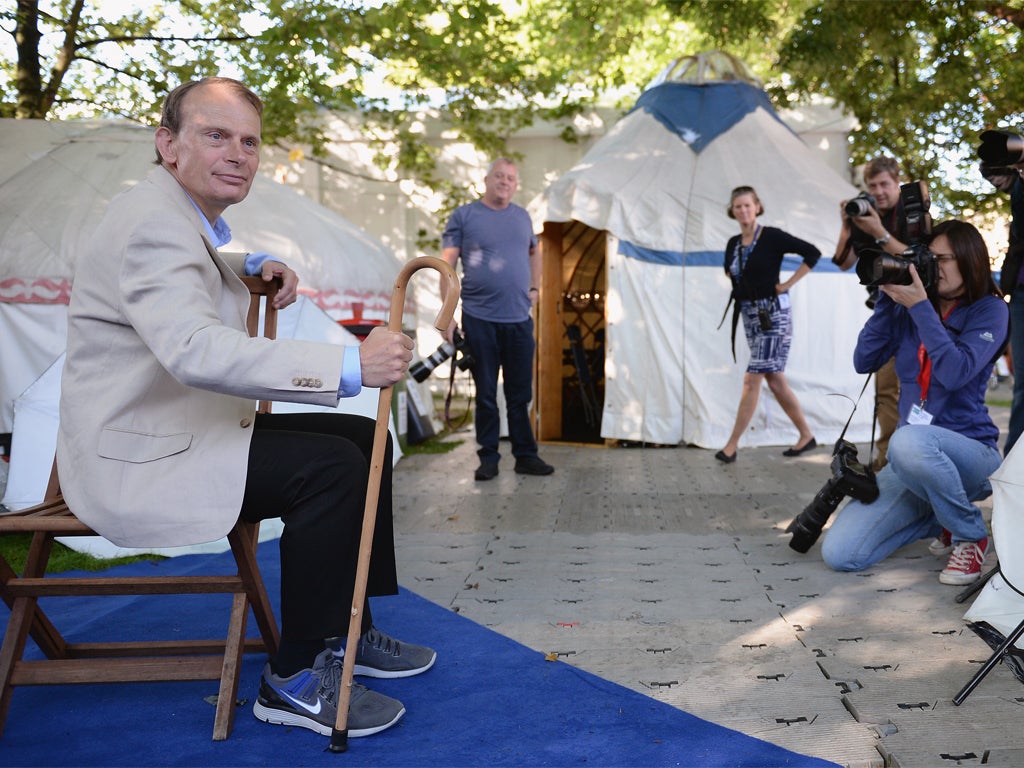Witty, lucid, sharp: Andrew Marr’s back – and it’s bad news for Alex Salmond
Matthew Bell witnesses a tour de force by the convalescing TV presenter in Edinburgh

It seemed entirely appropriate that Andrew Marr should choose Scotland as the venue for a triumphant return to public life.
Speaking for the first time since suffering a stroke in January, the Glasgow-born journalist yesterday dazzled an audience at the Edinburgh Book Festival with his wit, lucidity and intelligence.
After decades of living in London, he also reaffirmed his loyalty to Scotland, saying he would choose a Scottish passport over an English one should the union be dissolved.
Though the 54-year-old walked on stage with a stick, and leaned on the arm of his interviewer, Gavin Hewitt, he displayed no sign of mental weakness as he discussed his book The Battle for Scotland. The 1992 volume, which examines the question of independence, has been reissued with a new introduction, written by Marr since the stroke.
He revealed he is no longer able to touch-type, because his left arm is “no good any more”, and was obliged to use the “terrible” voice-recognition software Dragon Dictate. As a result, a mistake has crept into the book: “Where I had talked of Scots waving Saltires, it appears as ‘sole tyres’, for which I apologise.”
In front of a capacity audience which included his mother, Marr issued a stark warning to Scots and English alike over the dangers of dismantling the union. Scotland will vote on the issue in a referendum to be held on 18 September 2014. He said few politicians, let alone voters, had fully considered the implications of such a move. “Nobody is talking about what kind of a Scotland we want after independence,” he said. “People in England haven’t really come to terms with what it would mean. It would mean losing Trident.”
He revealed that when he asked the Ministry of Defence what would happen to nuclear submarines stationed in Scotland, they suggested they could lease the base back, or designate it sovereign UK territory similar to Cyprus. He said they ruled out the possibility of moving them to England.
The former editor of The Independent openly dismissed the American polling expert Nate Silver, who four days ago said the Yes campaign had “virtually no chance” of winning next year’s referendum. “I think it’s going to be much closer than the polls would suggest,” he said, “and certainly than Nate Silver suggests. “There’s a huge undecided vote, a lot to play for.”
He warned that there would be other damaging consequences of independence: “Because of loss of population, I suspect the UK would lose its permanent seat on the UN security council, and its voting power within the EU would be radically slashed, well below that of France and Germany.” He added that David Cameron and George Osborne would become “smaller figures” on the world stage, saying “they would be taken less seriously in Washington”.
Despite making his own views clear, he said the BBC, for which he works, must remain neutral. Earlier this month, Marr admitted that he had been working too hard prior to the stroke, which occurred after a particularly intense burst on his rowing machine at home. “I had been working at an insane rate,” he said. “That was my fault. It was what I chose to do. I had this idea that I could do more than anybody else.”
The stroke was on the right side of his brain which, for a writer, is considered the less bad side, as the left-hand side deals with memory, reading and writing. He was nursed back to health by his wife, the Guardian columnist Jackie Ashley.
Yesterday was Marr’s only scheduled appearance at a book festival this year. He plans to return to his Sunday morning Andrew Marr Show on the first Sunday of September, and has been commissioned to make three films about Scotland next year, including one on Boswell.
Earlier this month he said he planned to “suck the juice out of life” from now on. Judging by this performance, he has already started.
Join our commenting forum
Join thought-provoking conversations, follow other Independent readers and see their replies
Comments
Bookmark popover
Removed from bookmarks